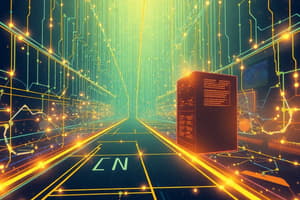Podcast
Questions and Answers
Which characteristic of network architecture focuses on maintaining performance without disruption when new users are added?
Which characteristic of network architecture focuses on maintaining performance without disruption when new users are added?
- Scalability (correct)
- Fault Tolerance
- Security
- Quality of Service
Which of the following statements accurately describe the role of servers in a network?
Which of the following statements accurately describe the role of servers in a network?
- Servers are always end devices that cannot operate as clients.
- Servers provide information or services to clients, such as emails and web pages. (correct)
- Servers act solely as intermediary devices facilitating communication between two end devices.
- Servers can only send data to end devices but cannot receive requests.
What is a significant requirement for a fault-tolerant network?
What is a significant requirement for a fault-tolerant network?
- Multiple paths (correct)
- Redundant data storage
- Single path connections
- High bandwidth capacity
Which of the following best describes an intranet?
Which of the following best describes an intranet?
What is a characteristic of a Peer-to-Peer Network?
What is a characteristic of a Peer-to-Peer Network?
What is one consequence of improperly configured Quality of Service (QoS) in a network?
What is one consequence of improperly configured Quality of Service (QoS) in a network?
Which of the following best describes the function of intermediary network devices?
Which of the following best describes the function of intermediary network devices?
Which type of network connects a large number of devices around the world?
Which type of network connects a large number of devices around the world?
What is the purpose of a Network Interface Card (NIC) in a network?
What is the purpose of a Network Interface Card (NIC) in a network?
Which of the following statements about physical topology diagrams is accurate?
Which of the following statements about physical topology diagrams is accurate?
Flashcards are hidden until you start studying
Study Notes
Host Roles
- Every computer on a network is identified as a host or end device.
- Servers provide data to clients, which include email servers, web servers, and file servers.
- Clients request data from servers, such as web pages from web servers and emails from email servers.
Peer-to-Peer Networks
- Devices can function as both clients and servers in Peer-to-Peer Networks.
- Recommended only for very small networks due to efficiency challenges.
End Devices
- End devices are the sources or destinations of messages in a network.
- Data flows from one end device, through the network, to another end device.
Intermediary Network Devices
- Intermediary devices connect end devices and include switches, routers, wireless access points, and firewalls.
- Functions include regenerating and retransmitting data signals, maintaining network pathways, and notifying devices of errors.
Network Media
- Communication across networks occurs through various media, facilitating message transfer between sources and destinations.
- Key components: Network Interface Card (NIC), Physical Ports, and Interfaces.
Topology Diagrams
- Physical topology diagrams show the arrangement of intermediary devices and cabling in a network.
Networks of Various Sizes
- Small Home Networks connect a few computers and the Internet.
- Small Office/Home Office networks link computers to a corporate network.
- Medium to large networks support hundreds or thousands of interconnected devices.
- World Wide Networks, like the Internet, connect millions of computers globally.
The Internet
- The Internet is a vast collection of interconnected Local Area Networks (LANs) and Wide Area Networks (WANs).
- LANs connect through WANs, which may use copper wires, fiber optic cables, or wireless technology.
- The Internet is not privately owned; structured maintenance is managed by various groups.
Intranets and Extranets
- An intranet is a private network of LANs/WANs within an organization, accessible only to authorized users.
Packet Tracer - Network Representation
- The activity focuses on numerous technologies applicable in CCNA studies.
Network Architecture
- Refers to technologies enabling data movement across networks.
- Must address four characteristics: Fault Tolerance, Scalability, Quality of Service (QoS), and Security.
Fault Tolerance
- Limits failure impact by restricting the number of devices affected.
- Requires multiple pathways to ensure continuity.
Scalability
- Allows rapid expansion to accommodate new users and applications without degrading service performance.
Quality of Service (QoS)
- Essential for ensuring reliable voice and live video services.
- Inadequate QoS can lead to performance issues like interruptions in live video due to bandwidth shortages.
Recent Trends
- Networks are evolving to meet the demands of new technologies and user devices.
- The landscape of wireless broadband continues to expand beyond DSL and cable options.
Studying That Suits You
Use AI to generate personalized quizzes and flashcards to suit your learning preferences.




